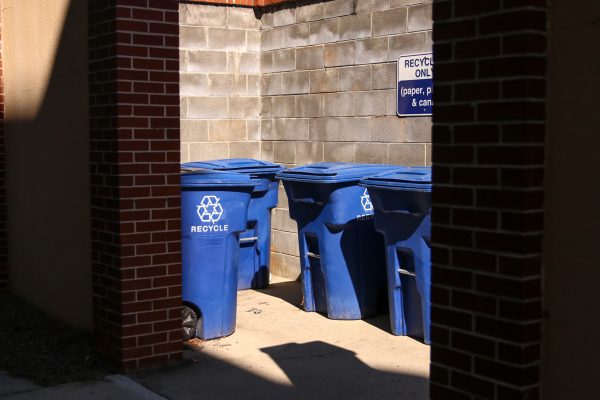
As part of Campus Sustainability Month, GCSU’s Environmental Science Club members learned about recycling, composting and waste reduction programs during its Oct. 8 meeting in Arts and Sciences 242. Lori Hamilton, GCSU’s chief sustainability officer, provided the presentation.
“We try as a part of our mission to advance sustainability as much as we can through education and outreach within the campus and the greater community,” Hamilton said, following the meeting.
Hamilton’s presentation highlighted the Office of Sustainability’s various student-led efforts, all of which are funded through the university’s required student-paid sustainability fee, which is $5 for the current school year. Hamilton emphasized to the club members that awareness and education are key to building a more environmentally conscious campus.
“If (students) want to be sustainable on the campus, they should just be mindful of where they’re putting their trash and are they putting it in the right container, are they recycling properly, are they cleaning out containers before they dump them, that’s probably the main thing,” Hamilton said.
At GCSU, recyclable materials include paper, paperboard, cardboard, aluminum cans, tin and steel cans and certain plastics. Additionally, Hamilton said, glass is collected separately at specific drop-off locations, while food waste, chemicals, tissue products and some plastics cannot be recycled.
Hamilton notes that the campus is an ideal place and time for students to learn about and begin practicing sustainability as they prepare for the future.
“I think we can use the campus as the learning labs for sustainability, being able to provide students with opportunities to take the knowledge they learn in the classroom and implement it, using it outside the classroom,” Hamilton said.
In addition to recycling, the Office of Sustainability manages a campus composting program to conserve food waste from the dining hall, a garden at West Campus and a glass processor. These initiatives are designed to reduce waste, reuse materials and strengthen ties with the local community.
Leah Bartleson, a junior environmental science major and the garden assistant and vice president of the Environmental Science Club, voiced that students can make an impact by being intentional with their habits and consumption.
“In my opinion, the environment is the biggest issue in the world right now, and on campus it’s just doing our little part to help with that,” Bartleson said. “This is the world we live in, and there’s too many of us in the world to waste our resources, because we’re already over the carrying capacity for the Earth.”
Bartleson also said efforts like composting food waste, growing food in the garden, recycling and thrifting are small but meaningful steps toward reducing students’ environmental footprints.
Gillian Arriaga, a senior biology major and president of the Environmental Science Club, noted that students can help make campus more sustainable by volunteering at the Office of Sustainability, participating in Environmental Science Club events and simply educating themselves.
“Education in general is a big impact,” Arriaga said. “If you don’t have time to do all these big events, just educating yourself through the resources that we have is really important.”
The Office of Sustainability offers several ways students can get involved, including volunteer opportunities, class service hours and paid internships.
Beyond coordinating regular recycling and composting, the office organizes larger waste reduction campaigns such as Dodge the Dump, which collects reusable items from residence halls during move-in and move-out and donates them to local charities, including Milledgeville Cares and Comfort Farms. In the spring, fraternities and sororities also participate in a campus-wide glass recycling competition.
Last year, GCSU was awarded a bronze sustainability rating by The Association for the Advancement of Sustainability in Higher Education’s 2024 Sustainable Campus Index. While Georgia Southern University and the University of North Georgia were also given bronze ratings, the University of Georgia and Georgia Institute of Technology were awarded gold ratings.
To reach that gold standard, Hamilton said, the goal is to continue growing awareness and encouraging students to take action.
“It’s important for everybody to be conscious of sustainability in the environment that they are working in and living in,” Hamilton said. “This is all we have.”
To learn more about GCSU’s Office of Sustainability, visit https://www.gcsu.edu/green.

